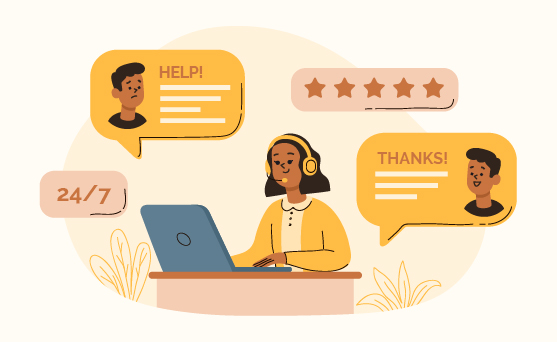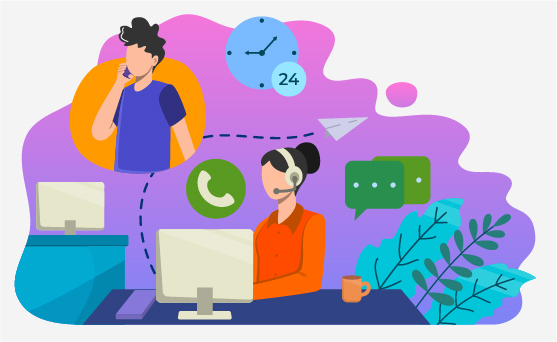How Phone Number Masking Strengthens Customer Privacy, Trust, and Compliance

Phone number masking helps businesses protect customer privacy and keep communication channels open. Your customers trust you with their contact information. Unprotected phone numbers can create privacy and security risks that break this trust right away.
Call masking works by hiding phone numbers of both callers and recipients from each other. This creates a secure channel that protects sensitive information. The technology helps companies reduce fraud risks and stay compliant with data privacy regulations like GDPR and CCPA. On top of that, it makes business interactions feel safer for customers by combining security with simplified customer service.
This piece will show you how phone masking works, why it's vital for modern businesses, and ways to use this privacy technology. You'll learn to protect your customers while building lasting trust and staying compliant.
Why Customer Privacy Is at Risk Today
Customer privacy faces unprecedented challenges in our connected world. The digital world has changed how businesses talk to customers but often puts personal data security at risk.
Increased Digital Communication
Digital communication plays a vital role in our daily lives. It lets us interact faster and more efficiently across any distance. Online activities have become deeply embedded in our routines, and privacy risks in the digital world have grown by a lot. Privacy stands as one of the biggest concerns in today's digital society.
The explosive growth of social media platforms and online communication tools has created serious ethical challenges about online privacy and security. Users must stay alert about their shared information and recipients, given the complex mix of privacy settings, encryption, and cybersecurity measures.
Common Privacy Breaches in Business Calls
Privacy breaches happen when unauthorized people access someone's personal information. These violations range from data breaches to social engineering attacks. Recent reports show that third-party involvement in breaches has doubled from previous years, mainly because of vulnerability exploitation. Data shows that stolen credentials played a role in 88% of reported breaches.
Social engineering attacks like phishing target human psychology instead of technical weaknesses. Attackers manipulate people to reveal confidential information.
Impact on Customer Trust and Retention
Lost customer trust causes the most damage from privacy breaches. Studies reveal that 65% of data breach victims stop trusting an organization after a security incident. This trust breakdown hurts businesses directly. 80% of consumers in developed countries will leave a business that compromises their personal information. Companies expect about 9% less global annual revenue because of data privacy crises.
The financial impact goes beyond immediate losses. Customers who learn about their compromised personal data lose faith in a company's security measures. This leads to reduced loyalty and lost business. Companies that use phone masking solutions face high stakes. Protecting customer privacy isn't just ethical, it determines survival in a marketplace where trust has become the most valuable currency.
Phone Number Masking as a Privacy Solution
Phone number masking stands as the cornerstone of successful communication privacy strategies. This smart solution creates a virtual barrier that keeps both parties' phone numbers anonymous during their conversations.
How Call Masking Protects Identities
Call masking shields identities by using a temporary proxy number that anonymizes participating phone numbers. Regular calls expose personal details, but masking adds a digital go-between that connects callers while hiding their actual numbers.
The system works just like a digital switchboard operator. It creates a temporary number that connects both parties without revealing their real contact details. The temporary number expires on its own after the interaction ends whether that's food arrival or ride completion which removes any worry about future unwanted contact.
Temporary Virtual Numbers Explained
These virtual numbers serve as short-term communication bridges that vanish once they've done their job. They differ from permanent virtual numbers used for local presence, as masked numbers only work briefly to protect user privacy. These proxy numbers act quietly in the background during conversations. The system picks numbers from its available pool. Some providers have huge collections.
Examples of Masked Phone Number Usage
Ride-sharing companies led the way in making this technology mainstream. Their systems let drivers and passengers talk without sharing personal numbers. Food delivery services adopted the same approach to connect customers and delivery staff safely. Doctors utilize masking to communicate with patients while protecting everyone's privacy. Real estate agents tap into this technology during property viewings to keep buyers' information away from multiple agents.
The technology has spread beyond these uses. Online marketplaces, travel services, and customer support teams now use masking to balance their communication needs with privacy protection.
How to Implement Phone Masking in Your Business
Phone number masking needs good planning and the right technical approach. Let's look at the practical steps to add this privacy layer to your business communications.
Choosing a Cloud Telephony Provider
Your phone masking success starts with picking the right service provider. Platforms like Knowlarity offer phone masking solutions for your industry needs. Review providers based on their privacy policies, terms of service, features, reliability records, and how well they can grow with your business. Make sure they provide programmable voice APIs and have enough phone numbers in your target regions.
API Integration and Setup Steps
The technical process to set up phone masking is straightforward:
- Integrate the provider's API with your existing systems (CRM, support platforms)
- Generate virtual numbers to serve as intermediaries between parties
- Configure call routing through these masked numbers
- Set up proper authentication and verification protocols
The system needs thorough testing before full deployment.
Contact us for a demo to see how these integrations work in your business setting.
Monitoring and Managing Masked Calls
Your implementation needs good monitoring systems to track masked communications through provider dashboards. Most solutions let you record calls, analyze data, and manage routing based on agent skills or availability. Some platforms use AI-powered transcription to log action items.
Avoiding Common Setup Mistakes
Businesses should watch out for several implementation issues. These include inconsistent caller ID display, wrong system configuration, and overlooking legal compliance requirements in different regions. Using the same masked numbers across unrelated departments can confuse customers. The core team needs proper training because employees who don't know the masking features might find it hard to use the system.
Beyond Privacy: Added Value of Phone Masking
Phone masking technology’s core value is privacy protection, but smart businesses find it offers far-reaching benefits across customer relations and operations.
Improved Customer Experience
Phone number masking improves customer satisfaction through secure, professional interactions. Companies that use masking solutions see better customer satisfaction scores for privacy and security. Customer trust ratings jump 25% after masked communications begin.
Better Operational Control
Phone masking streamlines internal processes beyond customer benefits. Smart call forwarding helps route calls quickly to specific departments or representatives. This central approach cuts time spent on wrong contacts by 45% and reduces privacy complaints by 40%.
Contact us for a demo to see these operational benefits firsthand.
Global Scalability and Local Presence
Businesses can establish authentic local presence regardless of their physical location through masked phone numbers. Research shows people respond more to calls from familiar area codes. Outbound call centers using local number masking saw 20% higher answer rates making campaigns more effective without extra infrastructure costs.
Data Insights and Call Tracking
Phone masking provides detailed call analytics that help companies spot common customer problems, track agent performance, and fine-tune marketing campaigns. These insights lead to focused training improvements and prove compliance with privacy rules. Companies see 35% fewer data complaints and 20% better efficiency.
Conclusion
Phone number masking is a vital technology for businesses that want to protect customer information while keeping communication channels open. This piece shows how masking creates temporary proxy numbers to shield both parties' actual contact details. This simple yet powerful solution helps address growing privacy concerns in today's digital world.
Without doubt, the advantages go far beyond basic privacy protection. Businesses report 25% higher trust ratings after adopting masked communications. The practical benefits are significant: simplified call routing, fewer privacy complaints, and better data collection.
Thanks to providers like Knowlarity, which handles millions of virtual numbers across many countries, the technology is now highly adaptable. Businesses of all sizes can find phone masking solutions that fit their specific needs.
Data breaches pose a constant threat to customer relationships. Almost all customers will leave a business that puts their personal information at risk. Companies that make privacy a priority create lasting customer loyalty and stay compliant with GDPR and CCPA regulations.
Phone number masking works as both a shield and a bridge. it protects sensitive data while enabling essential communications. The real question isn’t if your business can afford this technology, but if you can afford to go without it.
Contact us to start implementing privacy-focused communication solutions your customers will appreciate and your business will benefit from.
Written By: Nikunj Gupta

